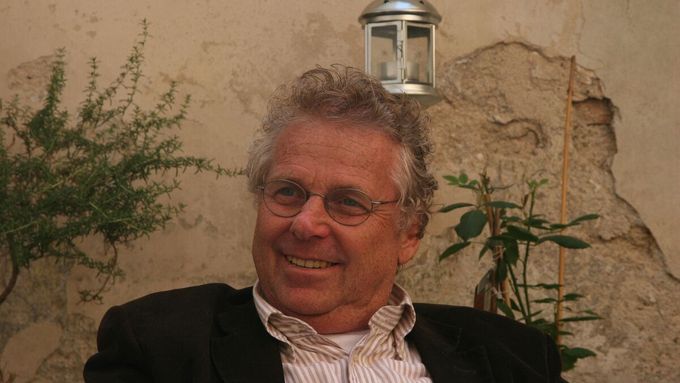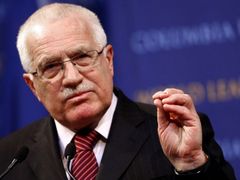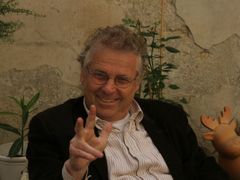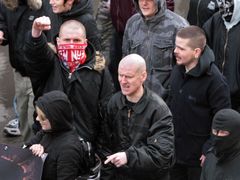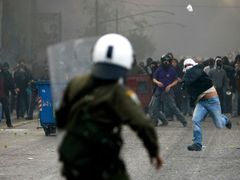Prague - Once a student revolutionary who tried to change the world, now a Green member of the European Parliament (MEP) trying to change the European Union's policies.
Daniel Cohn-Bendit visited the Czech Republic this week to present a program called Green New Deal on the eve of the European Parliament (EP) elections.
A fervent supporter of the Lisbon Treaty and climate change activist standing against a sharp critic of the Lisbon Treaty and climate change opponent - it was inevitable there would be a clash between him and president Klaus at a January meeting at the Prague Castle.
"No one has spoken to me in this style and tone in my six years here. I thought these methods ended for us 18 years ago. I see I was wrong... You are not on the Paris barricades," president Klaus said at that time at the Prague Castle.
"Václav Klaus thinks he is a little Bohemian king who can do what he wants in the world. But these times are over," the leftist radical-turned Green MEP said about Václav Klaus in an interview with Aktuálně.cz, in which he also talks about the fall of the Czech government, growing extremism in Europe and green policy and way of life.
Q: What were your thoughts when you learned that the Czech government was voted down in a no-confidence vote in March?
At first I thought it was too surrealistic an event. This was a real attempt against the whole European idea. There you had tragedy and comedy in one.
Q: What kind of impact from your point of you it had on the operation of the EU?
The problem was it weakened the Czech EU presidency. You had a situation where everybody was thinking "When is the next presidency?". It made also a sad point for the Czech Republic. They had a chance with the presidency to show what the capacity and ability of a country like the Czech Republic is. And then it disappeared.
Q: Does it mean no important decision is going to be taken until the end of the Czech presidency? What will happen with the election of the European Commission (EC) chairman?
We as the Greens in the European Parliament are against nominating the chairman of the EC now. We think we have to wait until the Lisbon Treaty is ratified. It does not matter whether it is under good or bad presidency. We don't want the Council to do the job, we [MEPs] want to do the job.
Q: Do you think it is president Klaus' competency to chair the European Council summit in June?
Well, I think the summit should be chaired by the head of the government, the prime minister in the case of the Czech Republic. There are countries with president as the head of the government, like France. But in Germany where the president has also only a demonstrative power, he would never get the idea he should chair the European Council.
I think this is a problem of Václav Klaus. He does not understand what he is and what Europe is. He thinks he is a little Bohemian king who can do what he wants in the world. But these times are over. And this is what he does not understand.
Q: The elections for the EP are near. The predictions for the turnout are not very great. What has gone wrong in the EU that people do not seem to be interested in EU issues?
You always have the same problem. People don't understand the importance of the decisions made by the EP. Most of people say the European Council is Europe's government. This is not true. This is our deficit. You elect 22 Czech members but people say what is 22 MEPs among 750? The importance of the national representation is still underestimated.
Q: Do you believe in European identity?
If you ask people in all the countries: Do you want your country to leave the EU? You would have a massive No, including Great Britain. People don't believe they can influence something in European politics. This is wrong and it is a problem. They don't understand that it is not only the Czech Green who are candidates. They are candidates with all the European Greens in Europe. They will be in a stronger bigger group of the European Union if people vote for them.
Q: What chances do you think the Greens have to enter parliaments and influence local or European politics? Aren´t the Greens too fragmented in most of the countries? You know the story of the Czech Greens.
It is difficult for me to say what the chances of the Greens in different regions are in local governments. In Belgium for example I know they have a big chance to enter a regional government. The problem is the Greens have to have a program which thez can realize in the government. A majority of the Greens in Europe want social ecological free market. Also, the Greens are against the nuclear power.
I think the Czech Greens are learning fast. The next group in the Czech Parliament and those who will be elected in the EP will be different. It is a story from the beginning. All beginnings are hard. It is like with child diseases. A child has lots of diseases. Then you grow, you mature and you get less diseases. Only when you are very very old, like the Social Democrats, then you get new diseases (laughing).
Q: What do you say to the growth of the extremist scene in Europe, be it right or left?
I think this is the danger of the crisis. Crisis makes people fear. There is the example of the crisis of 1929 which brought fascists and Stalinism. In a crisis you have a part of the society that becomes militant. And this is a problem. You have this problem here, in Hungary, in Bulgaria and in East Germany. All former communist countries have this problem. In democrati countries people should stand together against this type of fascism not matter in what they believe. This is a real task for the former communist countries to stand together.
Q: What would you do with parties like the Czech Workers' Party that acts aggressively?
To ban a party you have to have rules. You can't decide just like that to ban a party. Banning a party can be also very dangerous. Of course, if these parties are in contradiction with the rules, if they take arms and want to overthrow the government, you can ban them. But you can't ban them only because they have terribly wrong ideas. If they attack the Roma, you can condemn them because they endanger the lives of others, which is a crime. If you can prove that the party said Do it, then you can ban the party. If there is such an attack on the Roma, the next day there must be ten twenty thousand people out in the streets, showing their solidarity with the Roma.
Q: And what about the militant left-wing radicals?
In Greece, for example, it was a revolt of the youth. Inside any revolting group you always have small groups that are militant. But otherwise it was thousands and thousands of young people who said: We have no chance. So you cannot compare them to the radicals.
Q: You were trying to change the world in 1968 and the 21st century has seen a number of engaged young people who are trying to change the course of the world to. If you compare your situation in the 1960s and theirs now, are there any similarities or just differences?
Our revolt was a revolt of hope. We said: The future is ours. And we can take it and make it ourselves. So we pushed the old generation and we took our lives in our hands. Today people think we have no future. We want a future. Unlike young people today we didn't know AIDS, unemployment and ecological catastrophs. Climate change - we didn't know. The world in our time was a bad world but we had no fear. The world today is producing anxiety.
Q: Do you see any major impediments for some countries to commit to the Kyoto Protocol in Copenhagen in December? Is there any danger that some of them would hesitate as a consequence of the global crisis?
No because we have Obama. With him we have a positive sign for everzbody. Obama said we have to tackle this with the financial crisis. But in Copenhagen we will have an agreement with the States United States for the first time, which will be a general overall agreement. But nobody will say: First, we have the economic crisis, then we have the climate change. I am not too optimistic, though, this agreement will be enough. But that is another question.
Q: What eco-friendly steps have you accepted in your personal life?
I have a car that is going on gas. Practically in the city I live I go only by bicycle or by foot. And we have a solar panel in our house in southern France.
